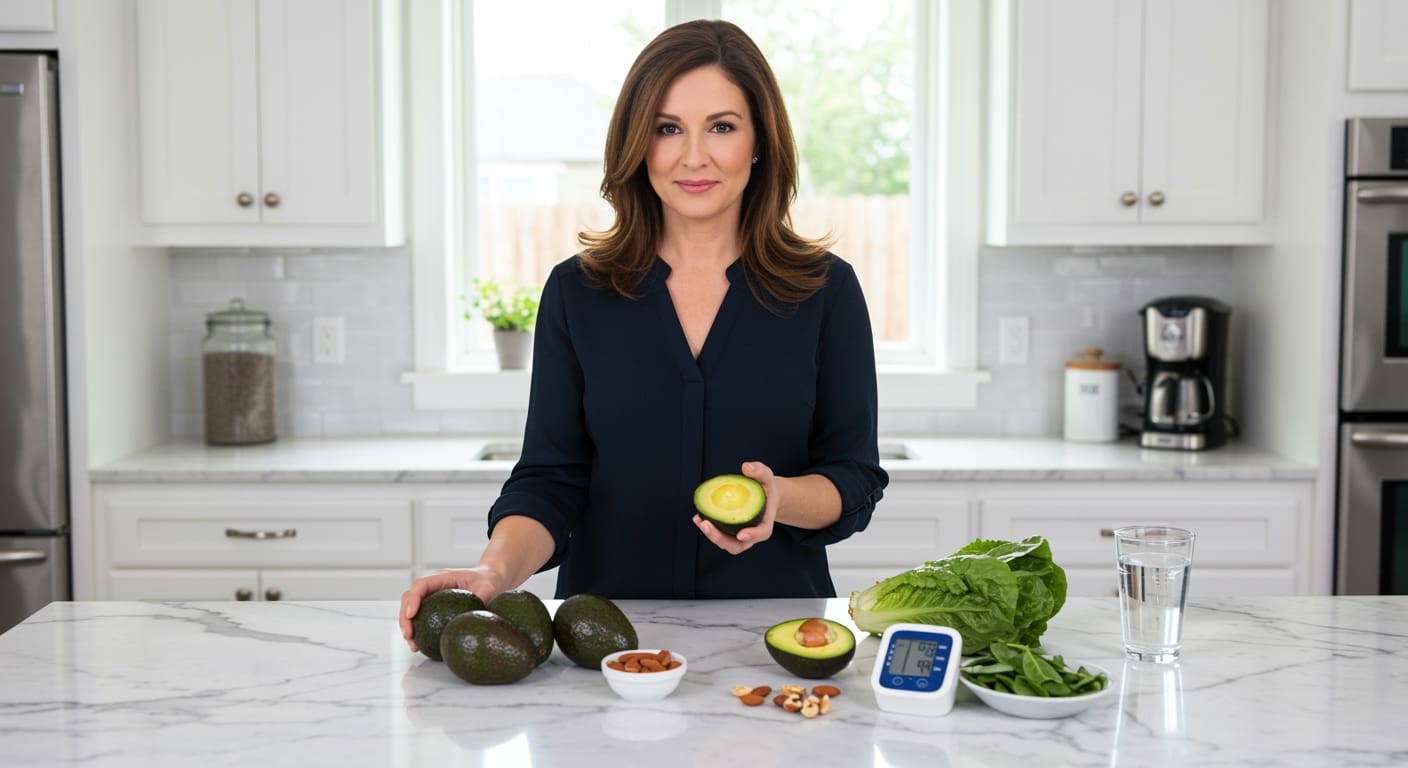✪ Key Takeaway: Avocados can help lower blood pressure through high potassium content, healthy fats, and fiber that support cardiovascular health.
Introduction
Your doctor tells you to watch your blood pressure, but then you hear conflicting advice about avocados being too fatty or perfectly healthy.
You might be wondering if this creamy green fruit can actually help manage your hypertension or if you should avoid it completely.
Hi, I’m Abdur, your nutrition coach and today I’m going to explain exactly how avocados affect your blood pressure and whether they deserve a place in your heart-healthy diet.
What Makes Avocados Special for Blood Pressure?
Avocados pack an impressive 975 milligrams of potassium per cup, which is more than most bananas contain.
This mineral acts like a natural blood pressure regulator by helping your kidneys flush out excess sodium through urine.
When sodium levels drop, your blood vessels can relax and your heart doesn’t have to work as hard to pump blood throughout your body.
The monounsaturated fats in avocados also play a crucial role in maintaining healthy blood pressure levels.
These healthy fats help reduce inflammation in your blood vessels, making them more flexible and responsive to changes in blood flow.
Research shows that people who eat avocados regularly have lower systolic blood pressure readings compared to those who avoid them.
The fiber content in avocados further supports cardiovascular health by helping maintain steady blood sugar levels and reducing overall inflammation in your body.
✪ Fact: One avocado contains about 25% of your daily potassium needs, making it more potent than most potassium supplements.
How Does Potassium Actually Lower Blood Pressure?
Your kidneys control blood pressure through a delicate balance of sodium and potassium in your bloodstream.
When you consume too much sodium, your body retains extra water to dilute it, which increases blood volume and raises pressure on your artery walls.
Potassium works at the cellular level by activating the sodium-potassium pump in your kidney cells.
This pump literally pushes sodium out of your cells while pulling potassium in, creating an electrical gradient that helps your kidneys filter blood more effectively.
The more potassium you consume from foods like avocados, the more efficiently your kidneys can eliminate excess sodium through urine.
This process also helps your blood vessels relax by reducing the amount of calcium that enters smooth muscle cells in your artery walls.
Studies demonstrate that increasing potassium intake by just 1,000 milligrams daily can reduce systolic blood pressure by 3-5 mmHg in people with hypertension.
✪ Pro Tip: Eat avocados with a pinch of sea salt to enhance potassium absorption while still maintaining the blood pressure benefits.
Do Healthy Fats in Avocados Help Your Heart?
The oleic acid in avocados is the same heart-healthy fat found in olive oil, and it directly impacts your cardiovascular system.
This monounsaturated fat helps reduce inflammation in your blood vessel walls by decreasing the production of inflammatory molecules called cytokines.
When inflammation decreases, your arteries become more flexible and responsive to changes in blood flow, which naturally lowers blood pressure.
Avocado fats also help your body absorb fat-soluble vitamins like vitamin K, which plays a role in preventing calcium buildup in your arteries.
Research indicates that people who replace saturated fats with monounsaturated fats from avocados experience significant improvements in both systolic and diastolic blood pressure readings.
The healthy fats in avocados also support the production of nitric oxide, a molecule that helps your blood vessels dilate and maintain healthy blood flow.
This combination of reduced inflammation and improved blood vessel function creates an ideal environment for optimal blood pressure management.
✪ Note: The fats in avocados are so beneficial that they can improve the absorption of heart-protective nutrients from other foods.
How Much Avocado Should You Eat for Blood Pressure?
Most nutrition experts recommend eating one-third to one-half of a medium avocado daily for optimal blood pressure benefits.
This portion provides approximately 300-500 milligrams of potassium without adding excessive calories to your daily intake.
You can spread this amount throughout the day by adding sliced avocado to your morning toast, mixing it into salads, or using it as a healthy fat source in smoothies.
The key is consistency rather than consuming large amounts occasionally, as your body needs steady potassium intake to maintain healthy blood pressure levels.
People taking blood pressure medications should consult their healthcare provider before significantly increasing avocado consumption, as the potassium content might interact with certain medications.
Combining avocados with other potassium-rich foods like leafy greens, tomatoes, and beans can amplify the blood pressure-lowering effects.
Remember that avocados work best as part of an overall heart-healthy diet that limits processed foods, excess sodium, and refined sugars.
✪ Pro Tip: Track your blood pressure for two weeks after adding daily avocado to see how your body responds to increased potassium intake.
The Bottom Line
Avocados are genuinely beneficial for managing blood pressure through their high potassium content, healthy monounsaturated fats, and anti-inflammatory properties.
The best medicine for your heart often comes from your kitchen, not your pharmacy.
I’d love to hear about your experience with avocados and blood pressure management, so please share your thoughts, questions, or results in the comments below.
References
At NutritionCrown, we use quality and credible sources to ensure our content is accurate and trustworthy. Below are the sources referenced in creating this article:
- Natural Medicine Journal: Avocado Intake Associated with Less Hypertension in Women
- American Heart Association: Avocado Consumption and Cardiovascular Disease Risk
- British Heart Foundation: Potassium and Heart Health
- PMC: Nutritional and Health Benefits of Avocado





